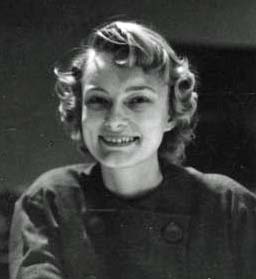Maryly Van Leer Peck facts for kids
Quick facts for kids
Maryly Van Leer Peck
|
|
|---|---|

Maryly Peck at a 1959 Society of Women Engineers board meeting in Chicago, Illinois
|
|
| President of Polk Community College |
|
| In office 1982–1997 |
|
| Preceded by | Fred Lenfestey |
| Succeeded by | J. Larry Durrence |
| Founder and Dean Guam Community College | |
| In office 1977–1982 |
|
| Dean of Engineering University of Guam | |
| In office 1970–1977 |
|
| Aerospace Engineer at United States Naval Research Laboratory | |
| In office 1963–1970 |
|
| Personal details | |
| Born |
Maryly Van Leer
June 29, 1930 Washington, D.C. |
| Died | November 3, 2011 (aged 81) West Palm Beach, Florida |
| Spouse | Edwin L. Carey |
| Children | 4 |
| Alma mater | Vanderbilt University University of Florida |
| Profession | Community college president |
Maryly Van Leer Peck (June 29, 1930 – November 3, 2011) was an amazing American educator and engineer. She broke many barriers for women in her field. Maryly was the first woman to earn certain engineering degrees from top universities. She also founded Guam Community College. Later, she became the first female president of a public college in Florida, Polk Community College.
Early Life and Education
Maryly Van Leer Peck was born on June 29, 1930, in Washington, D.C.. She was the second child and only daughter of Blake Ragsdale Van Leer and Ella Lillian Wall Van Leer. Her parents were friends with famous engineers like Frank and Lillian Gilbreth. This showed Maryly early on that engineering was a possible career for her.
Maryly was the top student in her high school class in Georgia. This earned her a scholarship from the state. However, at that time, Georgia Tech only accepted male students for engineering. Even though her father tried to get her in, she couldn't go there.
So, Maryly spent a year at Duke University. Then, she transferred to Vanderbilt University in her second year. There, she could study chemical engineering. In 1951, she graduated from Vanderbilt with very high honors. She also became the first woman to join Tau Beta Pi, an honorary engineering group.
Four years later, she made history again. She became one of the first women to get an engineering degree from Vanderbilt. She was also the first woman to earn a master's degree in engineering from the University of Florida. She continued her studies and received her doctorate from the University of Florida in 1963.
A Career of Firsts
While working on her master's degree, Maryly started helping older students with math. A professor at the University of Florida noticed her talent. He asked her to teach his class when he was away. This was the start of her many teaching jobs.
Maryly stayed connected with the Society of Women Engineers (SWE) throughout her career. She was even the National Chair of Student Affairs. After her parents helped get the first women admitted to Georgia Tech, Maryly helped set up a SWE chapter there. This provided a support network for the new female students. By 1962, she was named the national vice president of SWE.
In 1962, while finishing her doctorate, Maryly got a job. She worked as an aerospace engineer for Rocketdyne Corporation and the United States Naval Research Laboratory. She helped develop solid fuel and engines used in space programs today. At this time, she was already a mother of four children. This made her story interesting to journalists, and she was interviewed by Life magazine in 1962.
Leading Colleges
Maryly's husband, Jordan Brown Peck, Jr., became an Episcopal priest. She moved with him when he decided to do missionary work in Guam. They lived there for eleven years. During this time, Maryly became the first woman dean of the College of Business and Applied Technology at the University of Guam. She helped create many four-year programs and chaired its board. She then founded what is now the Guam Community College.
In 1982, Maryly was chosen to be the President of Polk Community College, now called Polk State College. She held this position until 1997. This made her the first female president of a public college in Florida. She was also the first woman to be named president of any of Florida's 26 community colleges. In 2005, she received the National Community Service Award. This award came from the Daughters of the American Revolution organization.
During her time at Polk Community College, a new campus was added in Lakeland. She also helped establish a foundation. By the time she retired, this foundation had $5.5 million for scholarships and college equipment. In 1995, Maryly received the "She Knows Where She's Going" award from Girls, Inc.. She later joined their national board.
After retiring in 1997, Maryly served as the headmaster of the Episcopal All Saints' Academy. She later joined the board for the Vanguard School.
Maryly was honored as a Distinguished Alumnus of the University of Florida in 1991. In 2007, she was inducted into the Florida Women's Hall of Fame.
Personal Life
Maryly married Jordan Brown Peck, Jr. in 1951. This was the same year she received her bachelor's degree. The couple had four children together.
In 1982, Maryly became the first woman to join the Winter Haven Rotary Club. Later, she also became the first woman to be elected President of that same club. In 2003, the Society of Women Engineers (SWE) interviewed her. They wanted to create a profile about her life as a pioneer. Maryly died in West Palm Beach in 2011, at 81 years old.
 | Laphonza Butler |
 | Daisy Bates |
 | Elizabeth Piper Ensley |

